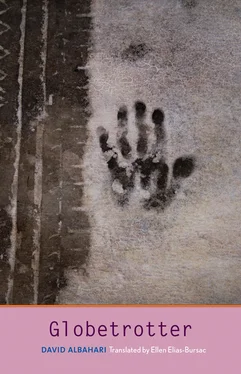Even if Quebec were to secede, he said, that would be no reason for war, but when the first inhabitant of Anglo-Saxon background has to leave his country because of pressure from French nationalists, then, he said, war will be inevitable. And what will go on between the new, independent Quebec government and the First Nations living on Quebec territory? About that, he said, he didn’t even dare think. About that, to be frank, I, too, did not dare think, but I didn’t want to say so. And besides, we had already been sitting there too long, drinking coffee, though, if nothing else, at least we no longer looked as if we were drowning. Daniel Atijas’s face had back its natural complexion and had freed itself of its phantom pallor, while my cheeks, I could see in the mirror that covered the wall behind his back, were flushed with color. We left and stood for a while out in front of the building in the warm rays of the afternoon sun. The fragrance of pines was in the air, a swarm of tiny flies hovered high above us, an elk was dozing on the grass across from us, sounds of a ball thudding against a racket at regular intervals came our way from the tennis courts, someone behind us spoke about the weather forecast, which included rain and possibly sleet, and I suggested to Daniel Atijas that we spend the time, until Ivan Matulić’s grandson arrived, at the Walter Phillips Gallery, where we could avoid, almost entirely, I said, the pressures of external sensation, reducing them to a minimum so we could recover. Daniel Atijas shrugged and came along. At the entrance we found a sign saying there was an installation on exhibit in the gallery of “New Work” by Argentinian ceramics artist Anna Maria Corazón, which very nicely, I said, suited our feeling of revival after a drunken binge.
In the middle of the main room there was a large clay plateau like one of those mesas in Arizona and New Mexico, and in its middle, lit by a powerful beam of light from the ceiling, was a lake filled with real water. The water flowed out in four directions and poured down the rim of the mesa, dividing it into four equal parts. At the bottom the water flowed into a channel surrounding the mesa that, when the circle was nearly complete, became an underground river. Here, I assumed, the water went into a hollow place beneath the mesa, from which it came up again, probably with the help of a pump, and poured back into the lake. Around the mesa, organized in a pattern that I could not divine, there were other island-like structures, filled with a large number of fantastical creatures, plants, and buildings, which a person, I thought, would need five or six months, if not more, to study carefully. We sat in chairs placed by the entrance and gave ourselves over to the burbling of the water. There are people, said Daniel Atijas, who still believe in new worlds, which is, he added, just a little pathetic, though comforting, too, given the times we live in — times in which, for certain, there are no new worlds to be had. I tried to counter this, but benignly, as much as the circumstances allowed, saying what I believed — that every artwork is, in fact, a new world — which would mean, I went on, that new worlds would continue appearing as long as there were people under the sun who created things. Daniel Atijas made no bones about masking the grimace of disgust on his face. Today’s artists, he said, are not much more than motes shed by the original trees, by the colossi that artists used to be.
It used to be that the finest artists were like giant sequoias, he said, towering above everyone else, but today, in the best of cases, they are no more than dwarf pines and cannot see themselves, let alone others. We, he said, are now regressing, and this, for certain, is a period of backward movement, like many others in human history, no doubt, but never has one lasted so long, nor has one offered us so little hope of radical change. This, he gestured toward the ceramic installation, is admittedly a consolation, but that is all that is left to us, consolation. We can hope for little else. His head dropped to his chest, his eyes closed, and I thought he would fall sleep, but then I saw that his eyelashes were fluttering and that he was peeking out beneath the lids. Maybe it wasn’t such a great idea for us to come to the gallery, I thought, because the coolness coming from the air conditioners refreshed the spirit and then dulled it, and the stimulating effect of the caffeine was slowly wearing off while its diuretic effect was becoming more pronounced. A dark-haired woman stepped into the gallery. She had on a dress with a flowery design, her hair was done up in a ponytail, she was in sandals. She went over to the mesa, crouched, and dipped the tip of her right index finger into the stream. Did he have any idea, I asked Daniel Atijas in a whisper, why Ivan Matulić’s grandson had spoken so often the night before of a secret? Daniel Atijas said not a word. The woman stood up, circled the mesa, stopped in the same place, crouched again. And did he know, I went on whispering, how I got to my room? Without standing up, the woman looked at me over her left shoulder.
With her right index finger she again touched the surface of the water. Daniel Atijas softly smacked his lips. The woman stood up and stretched, and for a moment her arms, outstretched, and legs, akimbo, described an almost-perfect letter X. Then she left. Daniel Atijas was convinced, he said a few minutes later when we went out after her, that she was the artist who had made the installation, and he could readily imagine, he said, the horror she must have felt when she came into the gallery and saw that there were only two discombobulated visitors there. Had I ever, he asked, sat in a gallery during one of my own shows and waited to watch the gallerygoers? And what did I then, he wanted to know, expect to see? He, he said, was appalled whenever he saw one of his readers. He of course had nothing against readers, he said, and in fact, he wasn’t at all concerned about them, but some of the people he saw, especially some of the women — no, he wouldn’t wish readers like that on anyone, not even on the writers of socialist realism. I continued to be interested in how I had reached my room the night before, but Daniel Atijas avoided answering, claiming that it wasn’t that he was avoiding an answer but that he did not know. Perhaps Ivan Matulić’s grandson, who’d be arriving shortly, would be able to help, said Daniel Atijas. The only thing he knew, he said, was that at one point he’d noticed I was no longer there, but he couldn’t remember whether Ivan Matulić’s grandson had said something to him, which didn’t need to mean anything, because it was quite plausible that he hadn’t asked him anything. Words by then had become as heavy as sandbags, he said, and every time he tried to speak, he had the impression that his tongue might snap off.
At the thought that Ivan Matulić’s grandson and he had been alone together after my departure, no matter what had transpired, everything inside me snapped. I staggered, and if Daniel Atijas hadn’t grabbed me by the elbow while at the same time opening the gallery door, I would have gone straight through the plate glass. I am certain of it. As it was, leaning on his arm, I managed to stay upright and stepped bravely out into air that, though warmer than it had been inside, was actually cooler, at least for me. It seemed, remarked Daniel Atijas, that neither he nor I was fully sober yet, for everything had been rocking back and forth for him a moment before in the hallway; for a moment he’d felt as if he had been standing still while everything else moved around him, but then he looked to his side, he said, and saw me, and everything somehow reverted to normal. He began walking again, keeping step, and again everything settled back into the way it was supposed to be. The sense of stillness couldn’t have lasted long, he said, but he knew this would be one of those moments he would never forget, that surge of certainty when he observed my steady pace, when he saw my eye blink. Interesting, he said, that in life it is often moments like these, apparently so trivial, that we remember more than we do the grand adventures or major thresholds, which last longer. It’s as if our consciousness, he said, no matter what that consciousness might be, accepts that a grain of sand means more than a whole desert, that in one grain of sand all the other grains are hiding; he who recognizes the grain, with his heart, if possible, can then understand the desert, he said, even if he has never set foot on it.
Читать дальше







![David Jagusson - Fesselspiele mit Meister David [Hardcore BDSM]](/books/486693/david-jagusson-fesselspiele-mit-meister-david-har-thumb.webp)




